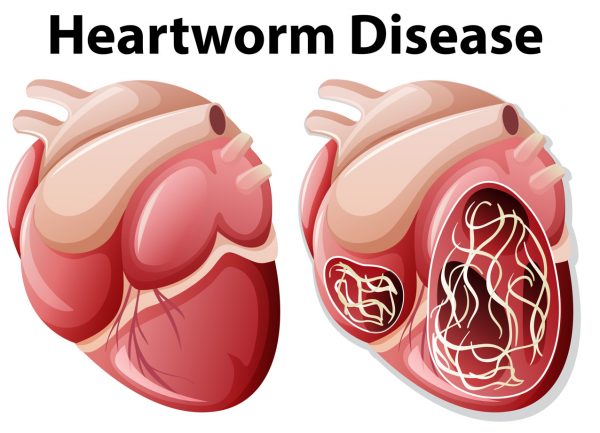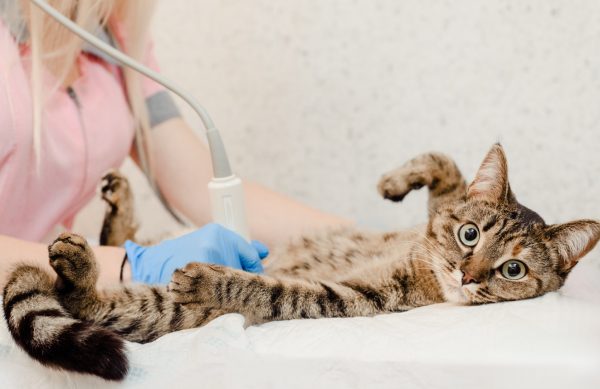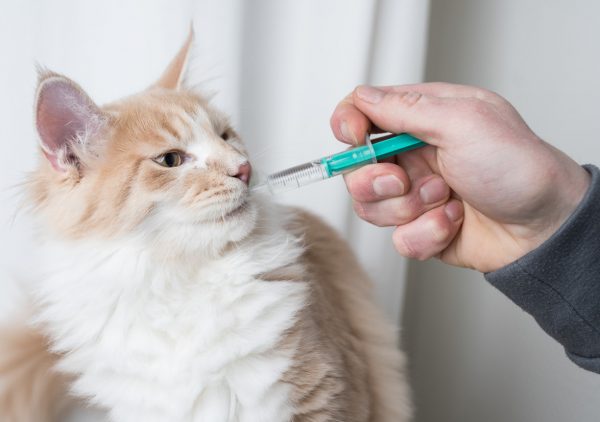Symptoms of Heartworm in Cats
Although it is true that canines are more frequently associated with heartworm than felines, it would be erroneous to say it never occurs in felines. In fact, in some areas of the United States, up to 15% of the feline population has been exposed to the disease through an infected mosquito bite.
 Even more, this condition occurs quite differently in felines than it does in their canine counterparts. To begin, it is important to look at the symptoms associated with this disease in cats. The most notable symptoms usually lie in the respiratory system. Symptoms of heartworm in cats include:
Even more, this condition occurs quite differently in felines than it does in their canine counterparts. To begin, it is important to look at the symptoms associated with this disease in cats. The most notable symptoms usually lie in the respiratory system. Symptoms of heartworm in cats include:
- Incessant coughing
- Throwing up
- Decline in normal activity levels
- Loss of weight
- Breathing that is quickened or labored
- Abnormal changes to heart rhythm
- Seizures
Unfortunately, one of the most challenging aspects of this disease is the fact there are no distinct symptoms that point to heartworms. This allows the disease to develop unnoticed and uninhibited, which can be deadly to felines.
Although some symptoms may begin to arise, the symptoms are usually not enough to raise alarm or they may be disregarded as something minor. In other circumstances, the condition may be advanced to the point where the cat will collapse out of the blue with no symptoms preceding it. In addition, the symptoms of heartworm in cats may be similar to other health conditions, such as anemia or diabetes.
What is Heartworm in Cats?
Heartworm is a type of parasite that is characterized as a nematode. Going by the more scientific name of D. immitis, this worm is contracted by an animal through the bite of a mosquito that carries the heartworm larva.
After the larva has entered the feline’s body, it can take up to 6 months before the parasite reaches adulthood. For felines, 90% of the heartworms fail to reach adulthood in its body.
Although some heartworms can live for three years in a feline, others die or remain immature in development. No matter what part of the lifecycle the heartworm is in, it can do major damage to the cat’s health.
Is There a Test to Detect Heartworms?
Although tests do exist to determine if the parasites are present, there are issues concerning their reliability and accuracy. Some diagnostic tests, such as antigen and antibody testing, attempt to establish a relationship between the parasite and how the body is responding to it. Both tests are very specific in their testing and often produce false-negative results.

What If My Cat Tests Positive for Heartworms?
A positive test for heartworms still does not signify that the parasites are present. A positive test means the cat has been exposed to heartworms, but it does not guarantee the feline is still contending with them internally. These tests, as one can see, are a hit or miss in many cases. Because of the uncertainty, a positive test may require further testing by the vet.
Sometimes a vet will utilize radiographs (X-rays), echocardiograms, and ultrasounds to determine if any of the vital organs or other body parts have been adversely affected by the worms’ presence. This can provide tangible evidence of the infestation of heartworms.
Is There a Vaccine for Heartworm?
For this precarious condition in felines, there are, surprisingly, no effective vaccines in existence at this time. Perhaps because the incidences of it are growing throughout the country at an ever-increasing rate, this will be more of a priority in the feline world. Even with the lack of vaccines, there are ample preventative measures that work well at protecting felines from this type of parasitic infection.
Can Indoor Cats Get Heartworm?
It is a commonly held belief that because a cat resides indoors, it is immune to the diseases of the outside world. In many different diseases, as well as this one, this is false. Felines that are kept strictly indoors comprise about 33% of all heartworm cases. Because of this, indoor felines should not be overlooked when it comes to the administration of preventative medicines.
Is Heartworm Contagious to Humans and Other Pets?
No, this condition is not infectious to other humans or pets. Because only a bite from a carrier mosquito can deposit heartworms, it would take a mosquito bite for others to be infected as well.

Treatment and Prevention of Heartworm
Treatment
In cases of these parasitic worms being identified in a feline, treatment is available not so much for the heartworms but for the symptoms they can produce. Unlike dogs that get this disease and can be treated, cats are not so lucky. There are currently no effective treatments available in the feline world for this type of parasitic infestation.
Because of this, the vet may concentrate all effort on anticipating and combating the symptoms that may arise, especially the symptoms related to the respiratory system because these are very common. Although some felines may pass away unexpectedly, the vet can use screenings and tests to keep up on the progress of the disease. This will help to efficiently treat the side effects accordingly.
Prevention
Without a doubt, prevention is the key to keeping this parasite away. At the vet’s discretion, a feline will be prescribed a monthly preventative medication that can either be ingested or spread topically. There is also a biyearly injection available. No matter what, consistency with administering these medications can save a cat’s life in the long run.

Life Expectancy
There is no average life expectancy for this type of condition. Unfortunately, in many cases, neither the vet nor the owner is able to tell to what extent the parasitic infestation is affecting the cats. Due to this uncertainty, sometimes the presence of heartworms is only known after the cat suddenly passes away. On the other hand, some cats possess stalwart immune systems that help them fight back. and these cats end up living longer lives.
Can You Get Rid of Heartworm Completely?
Although it may be possible for the feline to be totally rid of the heartworms, the effects of the worms are often a lifelong issue to be dealt with. Usually, cats with exceptionally strong immune systems are able to do away with the worms in a matter of a few years. Many may require a concerted effort from a vet in order to be rid of the worms. As mentioned before, however, most felines do not survive this condition.
Living and Management
If a feline is formally diagnosed with this parasitic infection, regular trips will need to be made to the vet for testing and examinations. The owner will need to be on the lookout for any new symptoms that may arise. The goal with this disease is to keep the cat comfortable and happy during the treatment of its symptoms.



